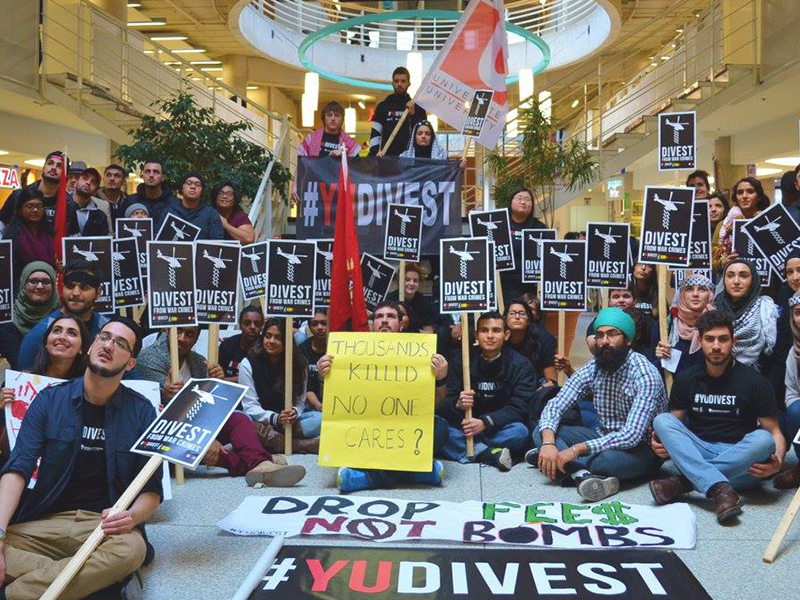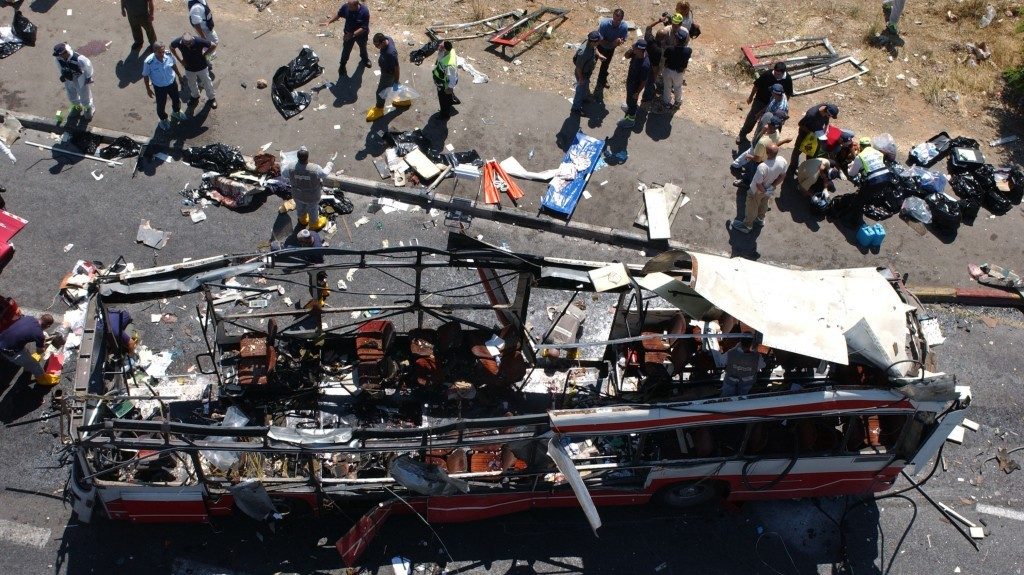
BDS is being pushed on York University students once again. Boycott Divestment and Sanctions (BDS) is a an antisemitic, global movement that promotes and supports various forms of boycott including against specific Israeli companies, as well as companies that do business with Israel.
As with other movements like Students for Justice in Palestine, or Jewish Voice for Peace, BDS aims to destroy the State of Israel, and promotes one-sided rhetoric. Currently, this movement is disguised as the student group YU Divest. Behind the #YUDivest movement is a coalition of students who call upon the University to divest from arms manufacturers and alleged war crimes. Amongst the five members are the York Federation of Students (YFS), and Students Against Israeli Apartheid (SAIA).
When I started out as a student five years ago, the movement’s images and messages on their posters were prolific and anti-semitic, as they singled out Israel, and companies that contribute to its defense, as the sole propagators of war crimes. Since then, the campaign has strategically avoided naming Israel as the sole menace; in turn, the country has been lumped in with middle east dictators and their far more egregious crimes.

The notion that Israel is the enemy, while it is the most well-behaved of the countries in question, is wrong. The agglomeration of Israel alongside countries that commit far worse crimes, while manipulating students into believing that their actions are morally equivalent, is dishonest. For example, Syria has deliberately attacked protected hospitals, and Saudi Arabia (whose actions are portrayed as morally equivalent to Israel’s by #YUDivest) has blocked humanitarian agencies from entering the city to help the civilians they’ve shelled.
The sinister propositions and actions perpetrated by #YUDivest contribute to the university’s antisemitic environment.
Other organizations that support the #YUDivest campaign include the Graduate Students Association, York U Alumni for Social Justice, and Amnesty International. This coalition of students, alumni, and faculty utilizes flashy posters and bi-termly protests to attract large audiences; through intimidation and manipulation, members of the #YUDivest club push their agenda onto students.
Because the coalition includes the support of Amnesty International, students are more likely to support the movement for its seemingly human rights-based intentions, despite the fact that Amnesty International has been criticised for its glaring bias against countries, including Israel.
#YUDivest’s Fundamental Flaws
While #YUDivest is quick to call out Israel for alleged war crimes, the movement’s supporters don’t seem to recognize the positive impact Israel has had in the Gaza Strip and West Bank.
Thanks to COGAT, a program designed to coordinate government activities in the territories of Gaza and the West Bank, Palestinians have received work permits, state-of-the-art medical treatment, and agricultural-related construction that significantly improves Palestinian standard of living.
With the increase in supplies and goods entering Gaza, Israel has consistently provided a growing economy for Palestinians and brought about dramatically increased life expectancy.
Israel has consistently expressed its willingness to create peace; the Camp David Accords in 2000, the Taba Proposal in 2001, and the Olmert Proposal in 2008, all show Israeli leaders’ willingness to foster peace. But despite attempted negotiations with Palestinian leadership, attempts to return territories won after the defensive Six Day War, and a full withdrawal from the the Gaza strip, Israel has not been treated with the same respect that other peace-seeking countries would be.
Israel still faces a much greater existential threat than most other countries; despite the target on its back, the country’s defensive actions are significantly less brutal and deadly than that of other countries. The Israeli-Palestinian conflict accounts for less than 1% of the world’s death rate.
The IDF, Israel’s military defence, operates in accordance with the inherent value of human life, regardless of nationality, race, or ancestry. Israel’s security fence was only erected after the Second Intifada, an intense and violent uprising of Palestinian terrorists against Israel in the early 2000s.

After the five-year battle, the defence measure attempted to prevent further terror attacks on the country, which is surely a much less severe reaction than other countries would have to similar issues. These do not sound like the statistics and actions of a country that creates genocides, and this absurd accusation is especially insulting when directed at a country whose people have experienced the world’s most horrific and systematic mass extermination.
The facts show that Israel’s military actions, including within Gaza, are in defense of its citizens. For example, the IDF was able to successfully restore security through Operation Protective Edge, in which Hamas fired nearly 250 rockets at the country, which violated the ceasefire established.
Additionally, Israel prides itself on conduct rarely shown by other militaries; for example, IDF members provide warnings and phone calls to protect innocent civilians from incoming airstrikes.
Israel’s case is unique; as with all forms of oppression and genocide, Israel must be assessed under the same light as the rest of the Middle East. Like any Middle Eastern country, Israel’s economic and social conditions vary, suffer, and upswing following any act of war against the nation. But because Israel is sometimes regarded as the hotbed of the Middle East, the country is frequently put on a pedestal.
There is an unjust status quo in which the Jewish state of Israel is targeted for opprobrium, and is routinely seen as the root instigator of the world’s problems because of this designated status. Double standards exist for Israel, and the country is criticised under a different set of principles than its Middle Eastern neighbours.This is one of the ways that Israel is criticised and delegitimized according to Natan Sharansky, Israeli politician and human rights activist.
People expect more from Israel, but only hear about the negative images and damaging myths that emerge from the media’s portrayal of the Israeli-Palestinian conflict. Israel should not be lumped alongside countries whose dictators perpetuate mass murder – insisting that it should necessarily involves an abandonment of nuance.
Above all, Israel is a shared home between Israelis and Palestinians that has resulted in more positive than negative impacts, which is completely ignored by the BDS movement. With its booming tech sector, innovative research, and recent achievements in aerospace, Israel stands on its own as a world superpower. But the BDS movement creates a negative image of Israel, demonizes the country, and fosters anti-zionism and antisemitism across our campus, even when disguised as the #YUDivest movement.
BDS does not accurately or factually compare regions and states of the world with one another. Some comparison is necessary and accurate; specifically, Israel should be held in a higher regard when compared to the horrors that exist elsewhere, especially in the Middle East.
Students such as myself shouldn’t be made uncomfortable with images of the #YUDivest club plastered around campus. Student and country alike, no one should have to put up with this kind of blatant misinformation, when any other government would react more severely to such antisemitic threats.
Contributed by president of York University’s CAMERA-supported group Israeli Students Association and 2018-2019 CAMERA Fellow Shira Ragosin.

